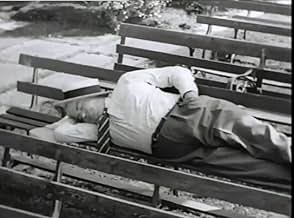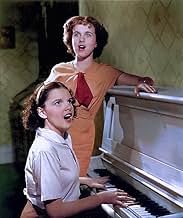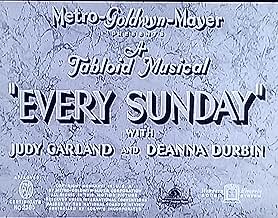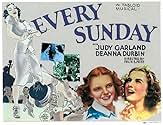Two teenage girls lend their fantastic singing voices to the cause when the city council threatens to replace the orchestra led by one girl's grandfather as the regular entertainment at the ... Read allTwo teenage girls lend their fantastic singing voices to the cause when the city council threatens to replace the orchestra led by one girl's grandfather as the regular entertainment at the Sunday concert-in-the-park series.Two teenage girls lend their fantastic singing voices to the cause when the city council threatens to replace the orchestra led by one girl's grandfather as the regular entertainment at the Sunday concert-in-the-park series.
Clem Bevans
- Man playing checkers
- (uncredited)
Jules Cowles
- Man in Audience
- (uncredited)
Paul Irving
- Mr. Bixby
- (uncredited)
Wright Kramer
- The Professor
- (uncredited)
Thomas Pogue
- Mr. Barfogle
- (uncredited)
Richard Powell
- Pop, Judy's Father
- (uncredited)
Kathryn Sheldon
- Woman Gotten out of Bath
- (uncredited)
Tammany Young
- Man Sleeping on Bench
- (uncredited)
- Director
- Writer
- All cast & crew
- Production, box office & more at IMDbPro
Featured reviews
Every Sunday was basically made as a screen test for MGM execs to choose which prodigy they wanted to contract. Obviously, they chose Garland, and Durbin went on to great success for Universal in "Three Smart Girls".
I love this short film, and although it has no plot, it is interesting to observe the dueling divas sing their hearts out.
I love this short film, and although it has no plot, it is interesting to observe the dueling divas sing their hearts out.
It was 1936 and MGM had acquired both Judy Garland and Deanna Durbin. Both about the same age, a little too old for kiddie movies, not quite ready for romantic leads yet. Add in the fact the neither of the girls had much experience in front of the camera. What do we do with them? Risk it all prematurely on a big budget full length feature? Nope...you start them both off in one short, designed to showcase each girls individual talent (Deanna was already being groomed as the "operatic" one, Judy as the "hot swing jazz" singer). And pull together a plot that is merely an excuse for us to hear these girls sing. Both girls went on to success in movies, each with their own particular style, but this was a part of their education and we, luckily, get to see it today.
8tavm
Having previously seen this short on VHS tape with the feature Summer Stock, I just rewatched Every Sunday on the TCM site. It marked the film debut of 15-year-old Deanna Durbin and of 14-year-old Judy Garland outside of her two older sisters. These two teens showcase their musical talents with a solo from Deanna of "Il Bacio", then one from Judy of "Waltz with a Swing" before the two climax with "Americana". The slight plot of this 11-minute film concerns the possible unemployment of Edna's (Durbin's real first name which is the way she's addressed here) grandfather's conducting job at the park because of low attendance. With the two girls' help, you can probably guess what happens from there! Contrasts are marked not only with Garland's and Durbin's musical choice but also with their height, poise, and movement. Despite all that, they perform quite well at the end and it's almost surprising that M-G-M chose Garland while Durbin was already contracted at Universal as this short was made but was briefly allowed back in since her feature debut (Three Smart Girls) was in the early preparing stages. Judy herself would make her first feature (Pigskin Parade) at 20th Century-Fox as M-G-M was deciding what movie she would next star in. That would be Broadway Melody of 1938 where she would perform the show stopping number, "Dear Mr. Gable (You Made Me Love You)". But back to this short, Every Sunday provides a warm and wonderful glimpse of two star singers at the beginning of their legendary careers unaware of what the future holds for them...
This one reeler produced by MGM in 1936 showcases the talents of two of its young stars under contract, Judy Garland and Deanna Durbin. In a way, these short films were promotional trailers that featured new talent in front, or behind the camera. Felix Feist directed this one which was a way to promote the two talented stars to the public.
The story is simple enough. The orchestra that entertains in a public park every Sunday doesn't get the attention it deserves. Enter two music aficionados, Judy and Edna, who love to hear the band play conducted by one of their grandfathers. Two of the town's elders sensing there is no public for this type of entertainment have decided to cancel their Sunday concerts in favor of a more popular orchestra that will attract a wider audience.
The two girls embark in a promotional tour of their own doing what they only know, calling and running errands and being helpful to their neighbors in exchange for a promise they will attend the park concert next Sunday. Well, that day comes, and to their surprise, hardly anyone comes as the music starts. The two girls decide to take matters into their own and ask the conductor to play a song for them to sing. The result is clear, people all over the park flocks to hear the talented young singers, thus ensuring the orchestra's existence.
Of course, the only attraction of the short film is the inspired singing by the two stars who are wonderful in their rendition. Ms. Durbin's operatic voice blends well with Ms. Garland's natural one creating a lovely duet.
Don't miss it whenever it shows on TCM!
The story is simple enough. The orchestra that entertains in a public park every Sunday doesn't get the attention it deserves. Enter two music aficionados, Judy and Edna, who love to hear the band play conducted by one of their grandfathers. Two of the town's elders sensing there is no public for this type of entertainment have decided to cancel their Sunday concerts in favor of a more popular orchestra that will attract a wider audience.
The two girls embark in a promotional tour of their own doing what they only know, calling and running errands and being helpful to their neighbors in exchange for a promise they will attend the park concert next Sunday. Well, that day comes, and to their surprise, hardly anyone comes as the music starts. The two girls decide to take matters into their own and ask the conductor to play a song for them to sing. The result is clear, people all over the park flocks to hear the talented young singers, thus ensuring the orchestra's existence.
Of course, the only attraction of the short film is the inspired singing by the two stars who are wonderful in their rendition. Ms. Durbin's operatic voice blends well with Ms. Garland's natural one creating a lovely duet.
Don't miss it whenever it shows on TCM!
Canthony is correct that this little short is just an excuse to hear a very young Judy Garland (fourteen years old!) singing with a slightly older (by one year) Deanna Durbin. But I must disagree with everything else he or she said, including the running time -- which is only about ten minutes, not twenty (a single-reeler).
The song is not her best, obviously; but it's enjoyable and definitely worth the ten minutes to watch on Turner. The duet with Durbin is quite interesting: two conflicting styles that nevertheless dovetail reasonably well.
The short is just a throwaway, but it's nowhere near as bad as the other reviewer made it out to be. Honestly, I enjoyed it.
Dafydd ab Hugh
The song is not her best, obviously; but it's enjoyable and definitely worth the ten minutes to watch on Turner. The duet with Durbin is quite interesting: two conflicting styles that nevertheless dovetail reasonably well.
The short is just a throwaway, but it's nowhere near as bad as the other reviewer made it out to be. Honestly, I enjoyed it.
Dafydd ab Hugh
Did you know
- TriviaThis film was not (as is often reported) a "screen test" of sorts produced by MGM to help the studio decide which of these two girls, Deanna Durbin or Judy Garland, to keep under contract. Durbin was released by MGM and signed by Universal prior to this movie's production. A blurb on 1 June 1936 in "The Hollywood Reporter" stated "Universal had changed Canadian-born Edna Mae Durbin's name to 'Dianna' [sic]." This movie, it appears, was not produced until at least July 1936, by which time Durbin had already been signed by Universal and cast in her debut vehicle, Three Smart Girls (1936). The reason she appeared in this film was reportedly due to a provision in her MGM contract which entitled the studio to request her services for up to 60 days following its termination, provided she was not already shooting a film at her new studio. As filming on "Three Smart Girls" was not scheduled to begin until September 1936, Durbin found herself back at MGM making this short with Garland. This is why, although her on-screen character is called "Edna" in the short (Deanna's real name), in the credits she is billed under the name by which she would soon become internationally famous, "Deanna".
- GoofsWhen the girls are singing, their mouths do not always match the soundtrack.
- ConnectionsFeatured in That's Entertainment! (1974)
Details
- Release date
- Country of origin
- Language
- Also known as
- Каждое воскресенье
- Filming locations
- Production company
- See more company credits at IMDbPro
- Runtime
- 11m
- Color
- Aspect ratio
- 1.37 : 1
Contribute to this page
Suggest an edit or add missing content




























